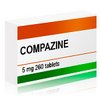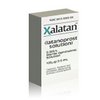INDICATIONS
Compazine is used for controlling severe nausea and vomiting and treating schizophrenia. It is also used for the short-term (4 weeks) treatment of generalized nonpsychotic anxiety. Compazine is a phenothiazine. It works by blocking a certain chemical (dopamine) in the brain.
INSTRUCTIONS
Use Compazine as directed by your doctor.
- Take Compazine by mouth with or without food.
- If you miss a dose of Compazine, take it as soon as possible. If it almost time for your next dose, skip the missed dose and go back to your regular dosing schedule. Do not take 2 doses at once.
Ask your health care provider any questions you may have about how to use Compazine.
STORAGE
Store Compazine at room temperature, between 59 and 86 degrees F (15 and 30 degrees C). Store away from heat, moisture, and light. Do not store in the bathroom. Keep Compazine out of the reach of children and away from pets.
MORE INFO:
Active Ingredient: Prochlorperazine.







